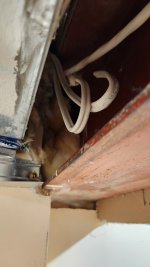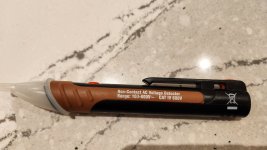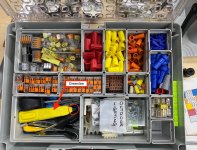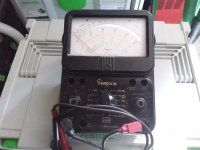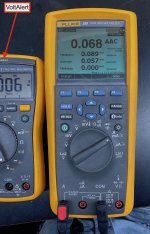Hello,
I was wondering if there are any electricians here that can recommend a voltage tester?
I had the $__t scared out of my this morning with my old one that I bought at a big box store.
I'm finishing my basement ceiling and working on my soffit/bulkhead to cover my hvac pipes and exposed Steel I beam. I pulled aside some insulation bat that someone had previously shoved in the I beam and noticed these two wires just hanging out in the I beams cavity.
View attachment 1
I didn't think anything of it at first but thought I should check to make sure they weren't live. I got my voltage tester out and it indicated that it was live and had been hiding in some insulating in a steel I beam for who knows how many years.
I was lucky to have hired a new electrician to do some work last week and he came by later today after his first job. At first he thought it was dangerous too until he pulled out his voltage tester. Nothing. Then he went and got his expensive voltage meter just to be sure an it still showed nothing. I showed him my voltage tester and it beeped like crazy. He said the cheap ones will go off with any kind of current. He promptly found the other end of the cut wires and yanked them out of the wall for me and left without charging me for the trip.
I can't remember the brand of voltage tester he showed me but I want something that will never give me a false positive again.
Suggestions?
I was wondering if there are any electricians here that can recommend a voltage tester?
I had the $__t scared out of my this morning with my old one that I bought at a big box store.
I'm finishing my basement ceiling and working on my soffit/bulkhead to cover my hvac pipes and exposed Steel I beam. I pulled aside some insulation bat that someone had previously shoved in the I beam and noticed these two wires just hanging out in the I beams cavity.
View attachment 1
I didn't think anything of it at first but thought I should check to make sure they weren't live. I got my voltage tester out and it indicated that it was live and had been hiding in some insulating in a steel I beam for who knows how many years.
I was lucky to have hired a new electrician to do some work last week and he came by later today after his first job. At first he thought it was dangerous too until he pulled out his voltage tester. Nothing. Then he went and got his expensive voltage meter just to be sure an it still showed nothing. I showed him my voltage tester and it beeped like crazy. He said the cheap ones will go off with any kind of current. He promptly found the other end of the cut wires and yanked them out of the wall for me and left without charging me for the trip.
I can't remember the brand of voltage tester he showed me but I want something that will never give me a false positive again.
Suggestions?

